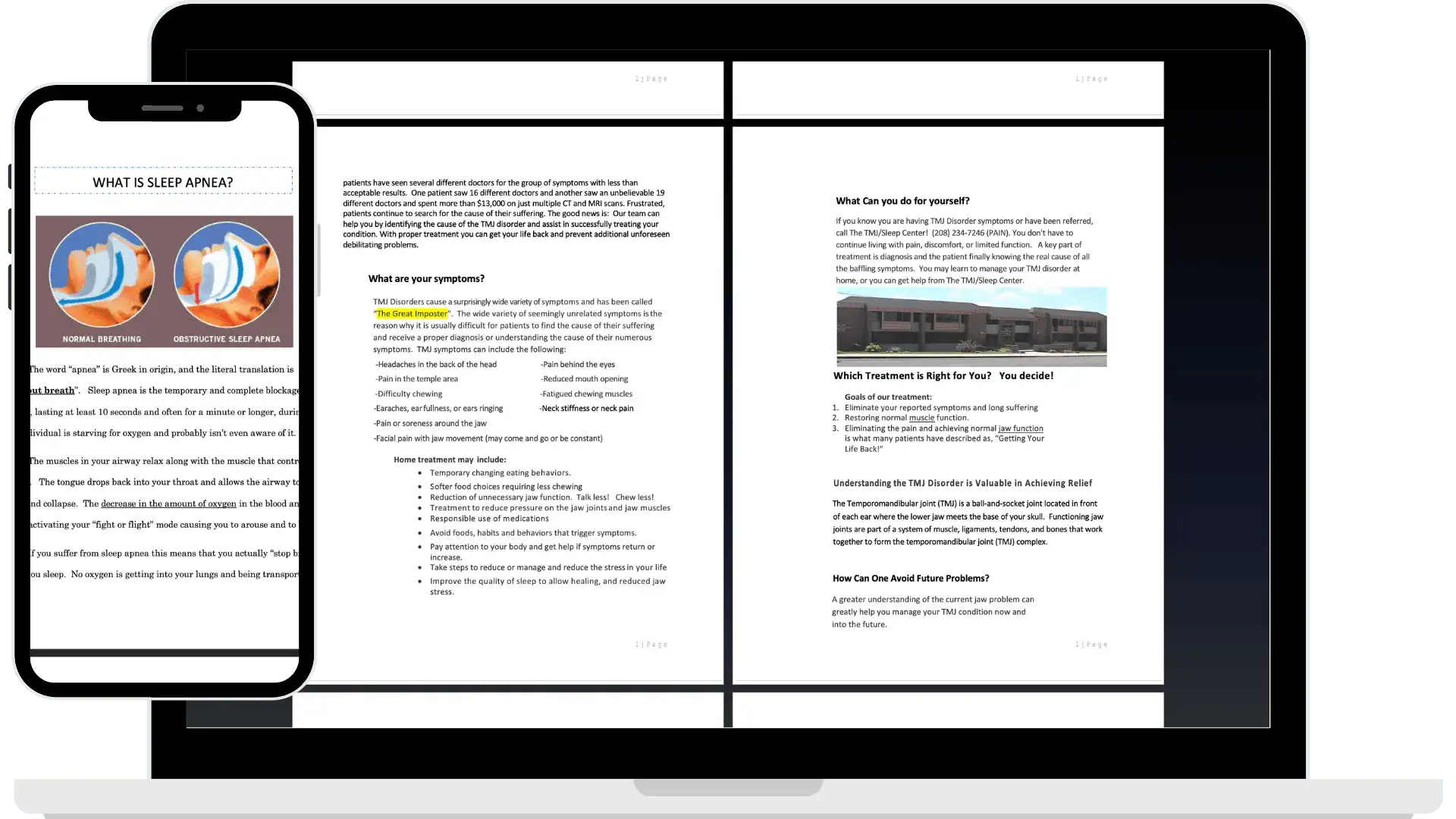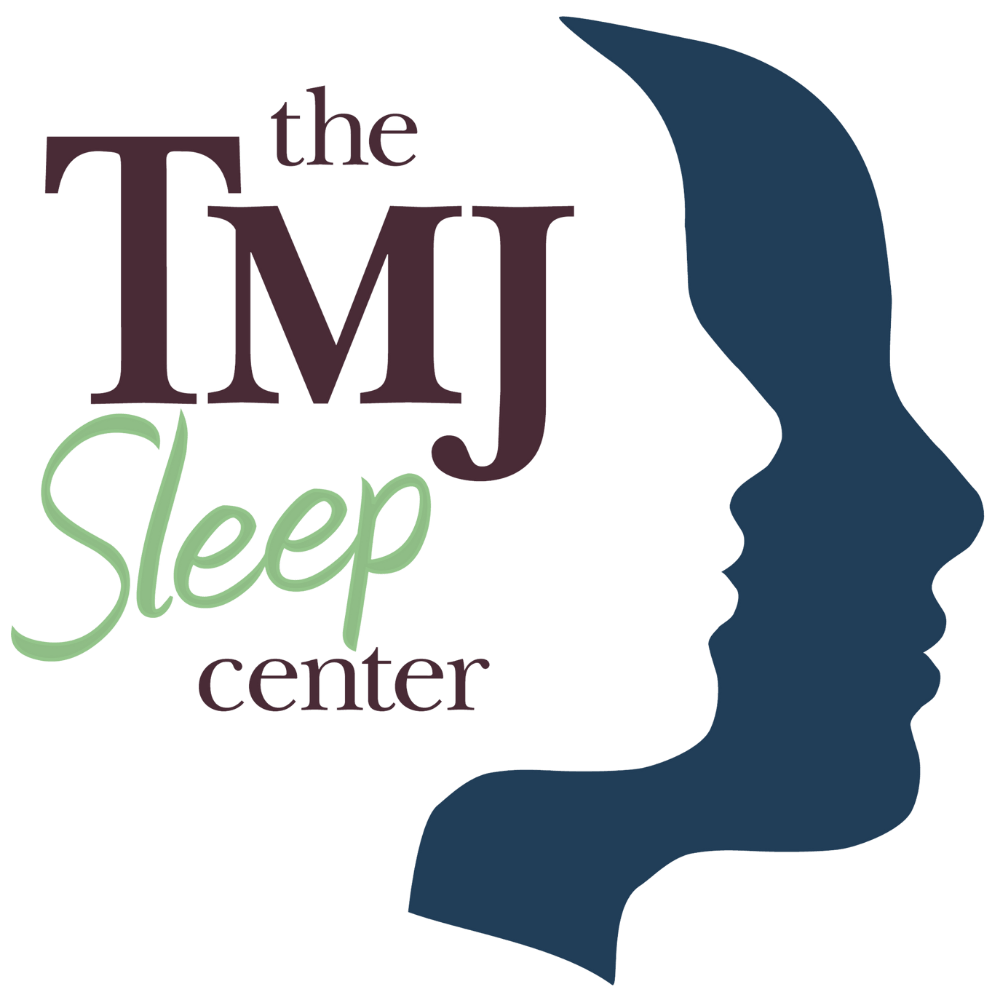Sleep Apnea Symptoms
Find Treatment for Snoring and Sleep Apnea
When you have sleep apnea, your breathing stops while you’re asleep. The Greek term for “breathless” is the root of the English word “apnea.” Because you stop breathing while you’re asleep, sleep apnea develops. Obstructive apnea, which occurs when your airway is blocked, or improper breathing control by your brain are the two causes of this (central apnea).
As a result, you run out of oxygen, which triggers a survival response that briefly awakens you so you can start breathing again. While keeping you alive, that response also disrupts your sleep pattern. That hinders you from getting a good night’s sleep and may have other negative effects, such as straining your heart, which may have fatal results. Come to The TMJ Sleep Center’s test clinic if you or a loved one is suffering from sleep apnea.
We work with all insurance companies when it comes to treatment coverage. Get a free consultation, free estimate, and our free patient consumer guide.
Call for an appointment or visit us today. Walk-ins are welcome.
Who Is Susceptible to Sleep Apnea?
Anyone, from young toddlers and infants to elderly people, can develop sleep apnea. Certain situations and demographic groupings are more likely to experience obstructive sleep apnea:
- It occurs more frequently in men and those who were assigned the male gender at birth before age 50
- As people age, their chances of developing it increase
- It is far more likely to develop if you are overweight or obese
- Asian, Hispanic, and Black persons are more likely to experience it
Affects of Sleep Apnea on the Body
Knowing a little bit about the human sleep cycle is useful for comprehending how sleep apnea operates. There are various stages to sleep:
- Stage 1: A light nap. Immediately the following sleep comes this brief interval. About 5% of your overall sleep time is taken up by it.
- Stage 2: Deeper sleep stage. You spend 45% to 50% of your total sleep time in this deeper stage (this number goes up as you get older).
- Stage 3: Slow wave sleep. About 25% of your sleep duration is spent in this stage, which is the deepest sleep stage (this number goes down with age). The third stage of sleep is notoriously difficult to wake up from, and doing so frequently results in “sleep inertia,” a feeling of “brain fog,” and sluggish thinking. In this stage, parasomnias like sleep talking and sleepwalking occur.
REM stands for “rapid eye movement” during sleep. In this phase, dreams occur. You can observe a person’s eyes moving just below their eyelids while they are experiencing REM sleep.
Disrupted Sleep Cycle
Your brain adjusts your breathing, heart rate, blood pressure, and other bodily functions as needed. Apnea or hypopnea can cause your blood oxygen levels to fall when you stop breathing.
When you stop breathing while you’re asleep or have almost no airflow, it’s called apnea.
The term “hypopnea” combines the Greek words “hypo” and “pnea.” Hypo means “low” or “under” in Greek. When these two basic terms are combined, it is said to be “under-breathing” or “low breathing,” which signifies you aren't breathing enough to keep your blood's oxygen levels stable.
Your brain responds to blood oxygen levels dropping due to either apnea or hypopnea by inducing a response that is similar to a failsafe, waking you awake long enough to breathe normally again. Your brain naturally tries to restart your sleep cycle as soon as you start breathing again.
These interruptions will occur more frequently the more serious your sleep apnea is. The average hourly frequency of apnea or hypopnea events – moments when a person stops breathing – is known as the apnea/hypopnea index (AHI). This is the key variable affecting how severe sleep apnea is. At The TMJ Sleep Center, we offer severe and mild sleep apnea treatments.
Causes and Symptoms
Sleep apnea is a very serious condition. In most cases, a patient’s partner alerts them that they may be suffering from sleep apnea. Turn to the efficient doctors at The TMJ Sleep Center if your loved ones are suffering from one of the following symptoms. Numerous symptoms of sleep apnea exist, some of which are more obvious than others.
Among the signs are:
- Insomnia
- Sweating during the night and being restless
- Sexual difficulties
- Waking up with a sense of being out of breath or choking
- Headaches, particularly upon awakening
- Waking up with a feeling of exhaustion or fatigue (people with sleep apnea may feel incredibly exhausted, even after a full night of sleep)
Daytime drowsiness – or drowsiness when driving, working, or engaging in other activities – may result in more severe occurrences.
Snoring is a typical symptom of sleep apnea (although it doesn’t always occur). Without snoring at all, you can still have sleep apnea.
Mood changes are common signs of sleep apnea, including depression and worry.
Alterations in brain activity are a symptom and include challenges with memory, concentration, or other aspects of the brain.
Constantly waking up in the middle of the night is another sign. Due to the fact that most people have trouble remembering when or why they wake up, this symptom may be more difficult to detect. People who do this frequently recall waking up for a different cause, such as heartburn or the need to use the restroom.
Factors That Increase the risk of Sleep Apnea
You are at a higher risk of suffering from sleep apnea if you:
- Are overweight
- Have a posterior jaw position (class 2)
- Have a large tongue
- Are over the age of 40
- Experience changes in vision (light sensitivity, blurred vision, etc.)
- Have difficulties in swallowing or tongue thrusts
- Experience changes in the fit of the teeth or the bite
Health Problems Caused by Sleep Apnea
- Diabetes
- High blood pressure
- Memory problems
- Weight gain
- Impotency
- Fatigue
- Headaches
Fortunately, there are treatments for snoring and sleep apnea at our clinic, including customized mouth appliance therapy using a mandibular advancement device. Oral sleep appliances position your jaw to widen the airway by preventing the soft tissues from closing.
Another choice is a CPAP machine. Come in for
sleep apnea treatment and meet with our dentist about your options. We treat obstructive sleep apnea, and you may learn about non-CPAP options.
Reviews
Related Sleep Apnea Services

Learn More About
The TMJ Sleep Center
Located at 1777 E Clark St, Pocatello, ID, We specialize in the treatment of TMJ disorders, migraine headaches, and sleep apnea treatments. Work with all insurance. Complimentary consultations. Walk-ins welcome. Call today for an appointment or visit us.


Share On: